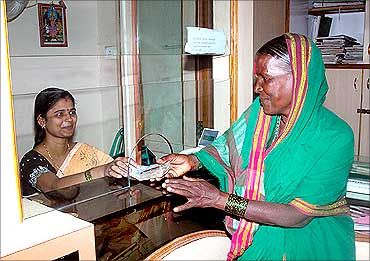Payments banks are niche banks set up by the Reserve Bank of India to further the agenda of financial inclusion.
 In the first round of payments bank licences given by the Reserve Bank of India (RBI) on Wednesday, prepaid payment issuers (PPIs), retailers and real estate companies have been left out of the fray.
In the first round of payments bank licences given by the Reserve Bank of India (RBI) on Wednesday, prepaid payment issuers (PPIs), retailers and real estate companies have been left out of the fray.
RBI has allowed telecom companies, retailers, PPIs, non-banking financial companies, real estate cooperatives and public sector entities to apply for payments bank licence.
Sources say the banking regulator gave preference to applicants with a clear business plans, specifically in the Northeast and Left wing extremism-hit areas. Another key concern was the need for deep pockets.
According to the guidelines, the minimum paid-up equity capital for payments banks needs to be Rs 100 crore (Rs 1 billion).
Since these banks will be operating on thin margins, it is likely it will take them at least four-to five years to break even. During this period, banks will have to maintain a capital base of Rs 100 crore on contentious basis.
These were the major points on which several applications were rejected, said people familiar with the matter. The panel had set aside applications by some pre-paid payment issuers and retailers, whose business plans were not clear on funding losses and there were concerns if they would be able to keep capital base of at least Rs 100 crore.
It is believed that broadly, RBI has stuck to names recommended by the screening panel, which carried out detailed scrutiny of applications. The panel had nine meetings before firming up the names to be recommended to the RBI.
The regulator has said going ahead, licences would be allowed on ‘tap’ basis. “The Reserve Bank believes that some of the entities who did not qualify in this round, could well be successful in future rounds,” said the central bank in a notification.
One of the applicants from prepaid card segment who had applied for payment bank licence said that they were disappointed and surprised that they did not receive the licence.
“We were confident that we met the eligibility criteria and had the requisite merit. Now, we have to take a re-look and then decide the next course of action on applying again under the on-tap process.”
Considering that the PPI players have a wide network, robust technology base and are already involved in remittance services, analysts believe they stand a chance to win the licence going ahead.
NEED TO KNOW
What are payments banks?
Payments banks are niche banks set up by the Reserve Bank of India to further the agenda of financial inclusion. These banks will provide small savings accounts and payments /remittance services mainly to migrant labour workforce, low-income households, small businesses, etc.
What can they do?
They can accept demand deposits — current deposits and savings bank deposits — from individuals, small businesses and other entities, but there is an upper limit of Rs 1 lakh per customer. Customers will earn interest on their savings account balance. They can accept and send remittances. The payments banks are also allowed to undertake utility bill payments and can distribute MF, insurance and pension products.
What are they not allowed to do?
They cannot lend to customers or issue credit cards.
Where can they deploy funds?
Payments banks can only park money in government papers and bank deposits.
What are the challenges they are likely to face?
Payments banks will face competition from the existing lenders. Besides, profitability will also remain a challenge as they will be working on narrow margins.









